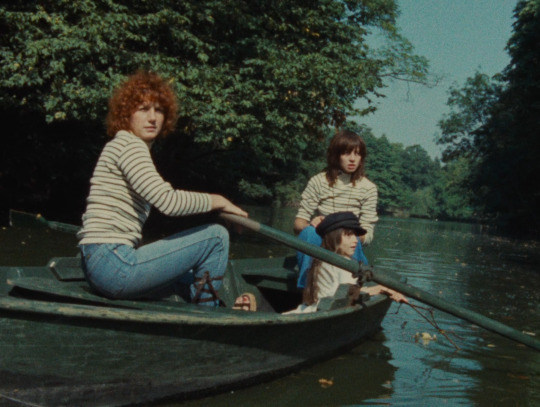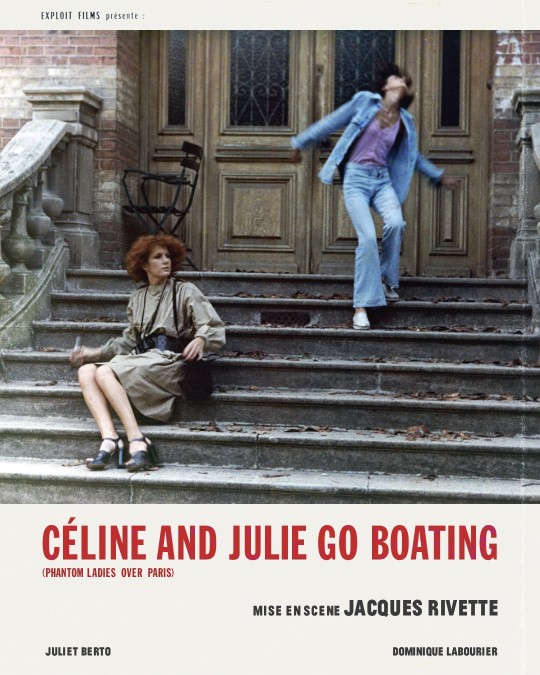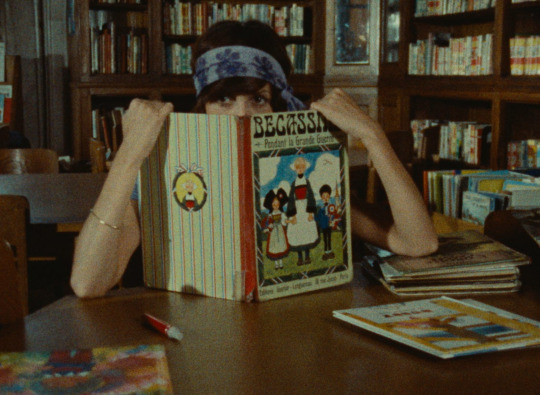#Labourier
Explore tagged Tumblr posts
Text

"Tiens-Toi Droite" de Katia Lewkowicz (2014) avec Marina Foïs, Laura Smet, Noémie Lvovsky, Sarah Adler, Lola Duenas, Jonathan Zaccaï, Michaël Abiteboul, Richard Sammel, Dominique Labourier et la jeune Lyna Ramdane, avril 2024.
0 notes
Photo





céline et julie vont en bateau (1974)
#céline et julie vont en bateau#celine and julie go boating#film#movie#cinema#art#edit#screencaps#photography#cinematography#70s#arthouse#indie#jacques rivette#dominique labourier#juliet berto
433 notes
·
View notes
Text

Céline and Julie Go Boating (1974)
by Jacques Rivette
65 notes
·
View notes
Text

Happy 80th, Dominique Labourier.
96 notes
·
View notes
Text

Mort Shuman et Dominique Labourier dans La Lune d'Omaha téléfilm réalisé par Jean Marbœuf le 26 octobre 1985.
8 notes
·
View notes
Text
them
44 notes
·
View notes
Text
.
#anyway i think maybe persevering and coming to work sick was maybe not a great idea#the breathing is labourious and im sure i Look pretty corpselike rn#also my whatever under my jaw is swollen and painful also#aaaaa easter weekend#a time for oeace and love or whatever the fuck the Christians are saying these days
2 notes
·
View notes
Text

Magic square (from Céline et Julie vont en bateau, 1974)
#magic square#Dominique Labourier#Céline et Julie vont en bateau#Phantom Ladies Over Paris#Celine and Julie Go Boating#Jacques Rivette#movies tv etc
5 notes
·
View notes
Text
Dans la langue que tu m’as donnée en héritage, dans ma langue maternelle donc, « mère » se dit MEER, qui en allemand signifie MER. On dit LA MER ou MA MER, en pompant sur le français. Pour « père », PER. Pour « grand-mère », GRAND-MER. Les femmes de mon enfance sont un élément, un océan. Je me souviens des jambes de ma mère, je me souviens de les enlacer, de lever les yeux vers elle et de dire : TU ES MA MER. Je me souviens d’avoir le sentiment d’être chez moi et d’être enveloppæ de la tête aux pieds. L’amour des mers était immense, on n’y échappait pas, on n’y échappe pas, on nage toute une vie pour sortir des mers.
Dans la langue que tu m’as donnée en héritage, dans ma langue de mer donc, il n’y a que deux façons d’être un corps, au masculin ou au féminin. Grandir dans la mâchoire de la langue allemande me forçait sans cesse à choisir mon camp à la balle au prisonnier.
Dans la langue que j’ai apprise de toi, dans ma MOTHER TONGUE, je ne sais pas comment écrire sur moi. Dedans, il y a la langue de ma mère, et tes yeux, et moi… mes… me… : moi-même – mon corps, mes corps, ma corporéité ? Il y a ce moi en train d’écrire, et il y a l’enfant que j’étais, forcæ de choisir son camp et de se couper en deux. Et l’enfant se confond avec moi, comme la Lune elle-même est inséparable de la Terre sans que rien les unisse, sauf que, quand j’écris, je dois faire la différence entre nous, car sans ça l’enfance, sans ça le corps d’enfant, sans ça le flot venu du passé m’emporte.
Mais ce n’est pas non plus si simple que ça : la langue de mer est sujette à de petites distorsions ou plutôt déviations – les femmes y sont des objets. Pour parler des MERS, toustes les adultes – y compris les mères – utilisent l’article neutre das qui n’est ni masculin ni féminin, réservé d’ordinaire aux choses inanimées : das Mami, das Mueti, das Grossmami, das Grosi. Et toutes les femmes sont neutres, pas seulement les mères : das Anneli, das Lisbeth, das Regini. Et les enfants aussi sont des objets, mignons comme tout, pas plus gros que des petites cuillères à moka : das Mineli, das Hänneli, das Hansli. Je me souviens que cette réification me mettait en colère. Je ne voulais pas être un objet, je voulais être une personne et je voulais être grandə ; et être grandə voulait dire choisir son genre, être homme. Être femme vous condamnait soit à rester objet soit à devenir océan. Je ne voulais pas.
Quand je pense à toi, grand-mer, je pense au restaurant Migros où tu m’emmenais chaque fois que tu voulais m’inviter « au restaurant », à la mer primitive, le berceau des premières bactéries, à 37 degrés tout pile, je pense à mer et à la vie à laquelle elle a renoncé pour moi, et à la vie à laquelle tu as renoncé pour mer, je pense que tu viens de sortir du centre de rééducation, que tu dois être de retour sur ton balcon à regarder avec colère tes géraniums à l’agonie, et je pense à tous les textes que je ne t’ai jamais écrits. Dans l’un d’eux, une dame barbue va à pied d’Ostermundigen à Saint-Jacques-de-Compostelle. À mi-chemin, elle rencontre une personne, jeune, avec de la barbe aussi, des épaules larges, une voix grave, une jupe et du khôl, et elles ne parlent pas, elles marchent en silence l’une à côté de l’autre en direction de la mer, et entre elles flottent les restes, les débris de leurs longues traces plongées dans la pénombre.
Hêtre pourpre, Kim de l'Horizon (traduit par Rose Labourie)
#citation#roman#novel#Kim de l'Horizon#Kim#l'Horizon#Hêtre pourpre#hêtre#pourpre#Rose Labourie#Rose#Labourie#Blutbuch#littérature#lgbt#genre#nonbinary#gender#queer
1 note
·
View note
Text
stamping my feet and rolling on the ground over inking this piece im working ok WEHHHHH
#peach patter#i cleared out my brush collection tho and got rid of all the brushes i never in my life have used after downloading#but idk why lining this pieces feels so labourious#im on DAY TWO !! of lining . normally i can bang out inks and colouring/rendering in a day or two but at this rate its gonna be 3-4 days :/
0 notes
Text

Dominique Labourier as Julie in, "Celine and Julie Go Boating," 1974 Dir. Jacques Rivette
#celine and julie go boating#vintage aesthetic#coquette#lana del rey aesthetic#vintage#cinnamon girl#dollette#1970s#1970s fashion#1970s movies#70s#thought daughter#classic movies#coquette aesthetic#girlblogging#films#film still#film stills#art#french movie#girlblog#girlblogger#girl interrupted#religion#sylvia plath#quotes#70s fashion#70s movies#70s aesthetic
56 notes
·
View notes
Text
Servants and Upward Mobility
This is focused on paid servants in England in the mid-late 18th century. One thing I find fascinating about the structure of domestic service roles was the existence of what essentially we might call a career ladder today. It was not uncommon for a servant to start their career near the bottom of the hierarchy as, say, a boot boy who cleans the shoes and boots of the household, or the scullery maid who does all the dirty kitchen work like scrubbing iron cooking vessels or plucking chickens, but progressively move up the list to better positions.
Part of why this was the case was that it was typical in England to hire servants for one year terms at a time. Often they'd be hired at festivals on the quarter days of the year, which as part of the festivities would often include what today we'd call a job fair. For some reason, Michaelmas (September 29) seems to be the most common as far as I can tell. I had never really thought about why that might be until I started planning this post, and I now wonder if it might have something to do with that being right around when harvest time usually comes in England. I could easily imagine people, especially young people, being on the cusp of another labourious harvest and thinking that maybe they could find another job instead. Related tangent: There are a number of remarks in the period that servants from the northern parts of England were considered to be much more respectful than servants from more populated, urban areas. Those communities were (at least considered to be) a lot stricter about remembering one's place and respecting your social 'betters', and their behaviour as servants was believed to reflect that. Some people would actively have their agents look to hire people from those rural areas, and apparently it was easy to attract potential employees: there are a number of remarks about how when a fancy carriage would drive through a small town, with the fancily-liveried footmen riding on the back, it would bring young people to stare in awe and want to be part of that. Which as someone whose interest in domestic service started in part because of my obsession with livery, I can understand. Anyway, back to the main point: because they often served one-year terms, there was an annual chance for both parties - the servant and the served - to review and determine how to move forward. A servant who was favoured might negotiate for a new position in the household, at least one step higher on the ladder (if not more), and they had leverage because they could leave the field entirely or possibly go off to a new household and find a higher position there. There was also a practice of asking for your master or mistress to provide a "character", essentially what we would today call a reference: a letter to show potential employers detailing their behaviour and skill in their role. Certainly there were times that some employers refused to give a good character, and sometimes that was explicitly because they wanted to keep the servant because they were a valuable asset to their household, but it was considered part of the obligation of the master class to be honest in these.
And it is not at all uncommon to find people who have served many different people/households throughout their career. The most I have seen is 28, although that's slightly misleading: that was a man who decided he wanted to travel, so hired himself to gentleman going on journeys for the duration of the trips, many of which were only a couple months. (The book he published, which he wrote about his travels and the "exotic" places and people he encountered, is interesting, and for my purposes super helpful because he turned out to be a narcissist and wrote a lot about himself, including his career as a servant. It's the only quasi-memoir of a paid servant from this time I am aware of. I might write a post about it/him sometime. I digress.) [continued in next post]
624 notes
·
View notes
Text





Took a break from sewing Edwin’s coat to work on his “confession outfit” and some other stuff:
repaired an old pair of my granny’s leather gloves
made green laces for my trusty brown boots out of green cords and a bit of thin copper wire
labouriously peeled off the designer label embroidered on the green shawl-collar jumper I was lucky to find at a thrift shop – sadly, it didn’t come off as cleanly as I’d hoped, so I had to darn the area, too
cut off the lower legs of a pair of trousers I’d dyed brown, gathered them below the knee and added buttons and buttonholes
added the white stripe (with white fabric marker) to the brown socks I’d found at a peddler’s stall at my local autumn market
47 notes
·
View notes
Text

labouriously crawling out of a hole, caked in dust, but i do it to draw miguelkaine for @mcgae 's birthdayyyy o(-< ilu
#miguel o'hara#comic miguel#spider-man 2099#kaine parker#scarlet spider#miguelkaine#FOR MY BESTIE#you make my every day brighter#zed art
122 notes
·
View notes
Text

Happy 81st, Dominique Labourier.
With Gérard Depardieu in Claude Goretta’s The Wonderful Crook (1975).
9 notes
·
View notes
Text
smaller pred, larger observer/ prey duo.
The observer feels safe to be around the pred, hungry or no, simply because the pred is smaller than them
However, they get the feeling that the pred wants to eat them.
if theyre not taking care of the pred post meal, the observer often notices the pred... sizing them up. An eager, calculating look in their eye. It unnerves the observer, but they know the pred cant do anything about this craving.
Possible endings:
The pred swallows the observer, but it gives them such a belly ache that they have to spit them out. The observer strangely sort of enjoyed their time in the preds stomach, even if it was short. Now they know it cant happen again, the pred learned their lesson. But now when they see the pred, knowing that theyve been inside that belly, it feels different.
The pred successfully swallows the prey, and has a long and labourious digestion. They feel proud of their accomplishment... but like. Physically it takes a really long time. And the pred gets bored and annoyer eventually
#Or the pred never eats them at all bc it is too hard or impossible#tw vore#soft vore#v/ore#fatal vore#digestion#vore writing#vore fic#implied digestion#v.ore#vore digestion
20 notes
·
View notes